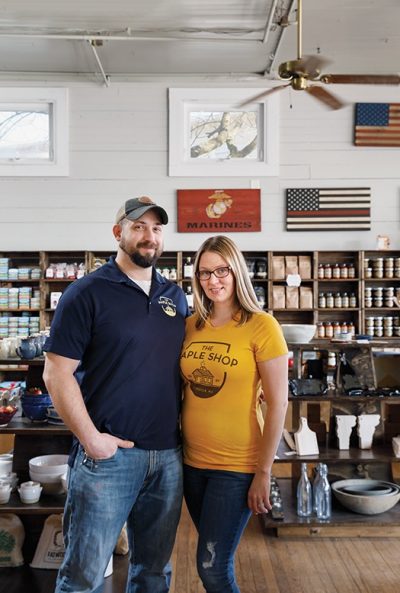
Wander into the Maple Shop on Main Street in downtown Chester, and owner Jon Rybkiewicz will quickly pour you a taste of Red Leaf Hollow Farms Vermont maple syrup, followed by a taste of a darker, earthier, bourbon-barrel-aged variety. He not only sells them, he makes them. Rybkiewicz says most of his customers, accustomed to imitations made largely from corn syrup, are happily stunned to discover the depth and complexity of the real thing.
As was Rybkiewicz himself, when he got his first taste in 2005. Retired from the Marine Corps as a sergeant the year before, he and his wife, Melissa, were living in central Jersey, where he was wiring homes and she was working in heating and air conditioning. They drove to Vermont to visit Jon’s parents. At a sugar house, as locals call it, he watched the owner boil sap into syrup. He brought Melissa the finished product in an empty Mountain Dew bottle.
“Neither of us had ever tried fresh maple syrup,” she recalls. “It was still warm, and it was delicious. Jon said, ‘We’re going to do this.’”
Thinking of it as a hobby, they began by tapping 10 trees on his parents’ property and boiling the sap in a turkey fryer. The next day, they were so enamored with the process that they bought a small evaporator and proceeded to tap 100 trees.
They decided to stay in Vermont, and in 2008 bought land, created Red Leaf Hollow Farms, and began making pure maple syrup in commercial quantities. They’ve kept it going, expanding the farm to 1,000 acres even after moving back to New Jersey in 2014 to raise their children in their home state.
[RELATED: The Daily Grind of a Master Knife Sharpener]
When the sap flows—peaking anywhere from early January to April—Rybkiewicz gets fired up about his 20,000 tapped trees, connected by a vast tubing system to the sugar house. The sap, 98 percent water and 2 percent sugar, on average, is put through a reverse-osmosis machine that removes some of the water before boiling, which raises sugar content to 16 percent. When the syrup reaches the desired thickness—about 33 percent sugar—it is filtered and bottled.
The Rybkiewiczs, who live in Chester with sons Benjamin, 7, Ethan, 3, and baby Samuel, born in December, use the Maple Shop, opened in 2018, as the primary retail outlet for their syrup. They also teach customers how to make their own, starting with identifying their own trees; the sap of sugar maples and red maples have the highest sugar content. The shop carries all the equipment necessary to do so on any scale and has helped more than 40 individuals and families set up their own sugaring systems by “giving them the buckets.”
The shop also sells a variety of other products from Vermont and local products from Chester. Chocolates, coffee, hot sauces, pancake mixes, small-batch jellies and jams, candles, soaps, pottery and wooden toys all sell well. The biggest seller, however, is syrup.
“People are starting to realize maple syrup is good for you,” Rybkiewicz says. “It has vitamins and minerals, and also has very high antioxidant values.” In fact, maple syrup contains more than 20 antioxidants, including phenolics, the disease-preventing compounds found in berries. While it is perfect for pancakes, waffles and French toast, syrup can be used to sweeten coffee or tea, as an ice cream topping, or as a glaze on vegetables or meats. Thanks to the Internet, Rybkiewicz has shipped his syrup as far as Russia, Italy and South America.
Rybkiewicz’s goal? “To keep making syrup,” he says. “We are literally making food from water, and that’s pretty amazing, if you ask me.”



